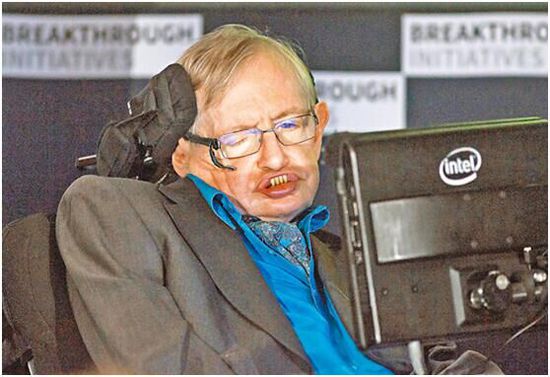


British famed physicist Stephen Hawking. (File phote)
British physicist Stephen Hawking laid out his concern over the future of Artificial Intelligence, said a report of paper.wenweipo.com on Jan. 20. He predicted that as science and technologies advance, human beings are facing a big risk of extinction caused by the nuclear war, global warming and genetically altered viruses.
The report noted that Hawking believed human race could survive even though after the disaster through moving to other planets. He warned people to watch out the risk caused by science and technology because human beings still could not build the outer space habitats in the future hundreds of years.
"In the next period of time, it is unlikely that a disaster leading to human extinction would happen on the earth, but the risk will increase gradually and the disaster almost certainly will appear in the future 1,000 years or 10,000 years," Stephen Hawking told the audience on Jan. 18, 2016.
Hawking has ever pointed out that the advanced artificial intelligence may lead to the extinction of human race in future. "All of us will not stop the development of science and technology, but we can timely recognize the potential risks and try to control them with endeavors," he optimistically expressed his opinion.
This article is edited and translated from《霍金:人工智能的進(jìn)步可能引發(fā)災(zāi)難導(dǎo)致人類滅絕》. Source: world.huanqiu.com.
 PLA holds joint air-ground military drill
PLA holds joint air-ground military drill Charming female soldiers on Xisha Islands
Charming female soldiers on Xisha Islands Beautiful skiers wear shorts in snow
Beautiful skiers wear shorts in snow Getting close to the crew on China's aircraft carrier
Getting close to the crew on China's aircraft carrier Chinese stewardess celebrate test flight at Nansha Islands
Chinese stewardess celebrate test flight at Nansha Islands World's first 'underwater skyscraper'
World's first 'underwater skyscraper'  Pentagonal Mart becomes the largest vacant building in Shanghai
Pentagonal Mart becomes the largest vacant building in Shanghai "Rent me as your girlfriend!"
"Rent me as your girlfriend!" A beauty's dancing youth
A beauty's dancing youth Top 20 hottest women in the world in 2014
Top 20 hottest women in the world in 2014 Top 10 hardest languages to learn
Top 10 hardest languages to learn 10 Chinese female stars with most beautiful faces
10 Chinese female stars with most beautiful faces China’s Top 10 Unique Bridges, Highways and Roads
China’s Top 10 Unique Bridges, Highways and Roads Old problems
Old problems US firms still optimistic about China: survey
US firms still optimistic about China: survey  Tribunal’s award in Philippines’ case turns blind eye to facts
Tribunal’s award in Philippines’ case turns blind eye to facts Commuters encouraged to put down their phones, pick up books
Commuters encouraged to put down their phones, pick up books Day|Week